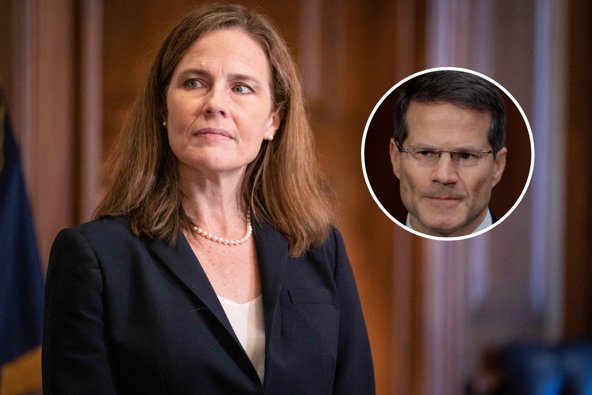
Barrett Questions Trump Team in Injunction Case
As the Supreme Court considers limits on nationwide injunctions, Justice Barrett’s pointed exchange with Trump’s legal team draws scrutiny from all sides.
Senators and Justices Clash Over Federal Court Powers
On Thursday, the U.S. Supreme Court heard arguments in a pivotal case concerning the legality and limits of nationwide injunctions—judicial orders from lower federal courts that halt executive actions across the entire country. The hearing sparked swift commentary from Senate Republicans and ignited debate within the Court itself, as Justice Amy Coney Barrett challenged the Trump administration’s stance in a high-profile exchange with Solicitor General John Sauer.
Senator John Kennedy (R-La.), a member of the Senate Judiciary Committee, strongly criticized the practice, describing it as a distortion of judicial authority. “When Congress makes a law, the federal judges are supposed to follow it,” Kennedy said. “They can't just overturn it because they don't agree with it.” He emphasized that nationwide injunctions lack statutory basis and have become a tool for judges to override laws based on ideology.
In support of the Judicial Relief Clarification Act, legislation sponsored by Senator Chuck Grassley (R-Iowa) to curb such injunctions, Kennedy remarked that modern judicial activism has led some judges to “rewrite the Constitution every other Thursday.” Senator Tommy Tuberville (R-Ala.) echoed the sentiment, stating that radical judges were obstructing the will of the American electorate. “If a judge wants to make political decisions, they should run for office,” he said.
Senator John Cornyn (R-Texas) added that the practice allows a single judge to halt executive initiatives nationally, a power he considers a “real problem.” He warned that without Supreme Court action, Congress must pursue reform through legislative means like Grassley’s bill.
Barrett Challenges Administration on Legal Boundaries
Inside the courtroom, it was Justice Amy Coney Barrett’s rigorous questioning that drew national attention. Appointed by President Trump, Barrett pressed Solicitor General John Sauer over whether the administration would respect federal appellate court rulings, specifically the Second Circuit’s rejection of Trump’s birthright citizenship order.
“So, you're still saying generally?” Barrett asked incredulously after Sauer suggested the administration would “generally” follow precedent. “That’s not what I’m talking about. I’m talking about this week.” Her sharp tone marked a rare moment of direct confrontation between a Supreme Court justice and an administration’s legal representative.
The exchange immediately generated strong reactions. Some conservative commentators accused Barrett of disloyalty, while others praised her for holding the government accountable. Democratic analysts, meanwhile, saw the moment as confirmation that the Trump administration was seeking to sidestep the judiciary. “Unless the Supreme Court tells them directly, Trump’s team might ignore lower court rulings,” said DNC delegate Seth Taylor.
This is not the first time Barrett has drawn criticism from the political right. Earlier this year, she joined Chief Justice Roberts and liberal justices in a 5-4 decision rejecting the Trump administration’s request to block aid funding, a move that led to renewed accusations of judicial independence turning into political apostasy.
Still, the Trump administration has expressed confidence in her overall record. “She’s a very good woman,” Trump said recently. “She’s very smart.”
The outcome of the Supreme Court case could arrive within weeks and is expected to hinge on the votes of Justices Barrett and Neil Gorsuch—both Trump appointees. Legal analysts suggest the ruling will set a significant precedent regarding the limits of lower court authority and executive power. Until then, the debate over judicial reach and executive restraint remains at the forefront of American legal and political discourse.






